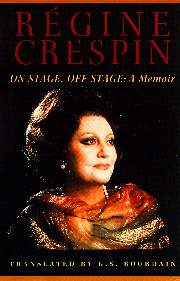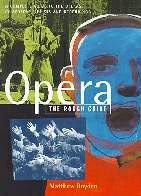Books / Livres
September 1, 1998
Version française...
Régine Crespin : On Stage, Off
Stage
Matthew Boyden : The Rough Guide to
Opera
Pierre Petit : Verdi.
John Ardoin : The Callas
Legacy
Régine Crespin : On Stage, Off
Stage
Northeastern University Press, 1997
289 pp. ISBN
1-55553-328-0
 Since its first publication as La Vie et
l'Amour d'une Femme (Actes Sud, 1982), French soprano Régine
Crespin's enchanting autobiography has been cherished as a classic
of artistic biography and women's literature. Now, thanks to a grant
from the French Culture Ministry, the revised and expanded 1997
version has been translated for English readers to enjoy. Since its first publication as La Vie et
l'Amour d'une Femme (Actes Sud, 1982), French soprano Régine
Crespin's enchanting autobiography has been cherished as a classic
of artistic biography and women's literature. Now, thanks to a grant
from the French Culture Ministry, the revised and expanded 1997
version has been translated for English readers to enjoy.
Crespin's book opens with an idyllic Provencal childhood, filled
with sensual heat and light, the perfume of food, flowers, and
flesh. She was close to her Italian grandmother Mannolini. They
would sing ribald songs together, before Crespin knew the meaning of
the words. Her father was a handsome, jealous Mediterranean who
opposed his daughter's singing. It took Crespin years to overcome
her Electra complex. Her mother was remote, frustrated, and often
drunk. "Among the people of the Midi, tenderness is something shown
on special occasions ... But give a little kiss on the neck or take
someone's hand? Out of the question; too embarrassing." Thus Régine
Crespin grew up with an emotional need that no mortal could ever
fulfil. Her life was a succession of encounters with magnetic men
and women who promised, but failed, to fill her inner void.
At the Conservatoire she admired men, but there was always some
problem. Her father interfered. One of her prospects was stolen by a
homosexual (gay men were later among her closest friends). Crespin
briefly sought consolation in another woman's arms. Finally, father
figure Edmonde Carrière, 25 years her senior, took her under his
wing, while her career moved from the provinces to Paris.
Her Kundry in Bayreuth in 1958 was her breakthrough. She had an
abortion, left Carrière, married Lou Bruder. They lived together for
11 years until she tired of his brutal sensuality and womanizing.
She was still shy, maladroit: 30 before she dared ask for affection,
35 before she went out dancing, 40 before she had a real friend.
Striking out on her own after Lou, she fell in love with
Victor-José, a charming Argentine. He wouldn't, or couldn't,
reciprocate. Her therapist discovered he was a repressed homosexual.
They remained friends. She had a four-year affair with
African-American conductor Henry Lewis, himself on the rebound from
Marilyn Horne. Lewis had unresolved racial complexes, demons which
Crespin couldn't understand. They parted amicably.
Cancer struck. Two horrible tumours. She underwent a hysterectomy
and later had chemotherapy and Curietherapy for breast cancer. The
radium needles stuck out of her breast for two days. After that, she
wouldn't allow men to touch her. She devoted herself to friendship,
to teaching, and to reading. She wintered in Senegal, wondering
about the afterlife and life on other planets, dabbling in Buddhism,
phytotherapy, astrology, reflexology, all the pastimes of a lonely,
idle woman in retirement.
Crespin had a superb voice, a great career, and a tragic personal
life. This book is the logical conclusion to the therapy she began
after Victor-José. It is a talking cure ‹ utterly frank, modest,
funny and non-judgmental ‹ in which she finally resolves the
conflict between Régine, her inner child, and Crespin, the Diva.
P. A.
Matthew Boyden :
The Rough Guide to Opera
Penguin Canada. 672 pp.
$34.99
ISBN 1-85828-138-5.
 The sleek layout
and insider attitude of The Rough Guide to Opera is
well-calculated to get smart beginners excited about the art form.
The book is divided into eight chronological chapters covering 132
composers, some rather minor. Each chapter introduces a musical
style or period in intelligent but accessible terms. Each composer
is likewise described and situated in his/her artistic and
historical milieu. Each composer's major works are described,
including dates of composition and premiere, librettist's name, and
a plot synopsis. The sleek layout
and insider attitude of The Rough Guide to Opera is
well-calculated to get smart beginners excited about the art form.
The book is divided into eight chronological chapters covering 132
composers, some rather minor. Each chapter introduces a musical
style or period in intelligent but accessible terms. Each composer
is likewise described and situated in his/her artistic and
historical milieu. Each composer's major works are described,
including dates of composition and premiere, librettist's name, and
a plot synopsis.
All this leads up to the "buyer's guide" CD descriptions. The CD
listings are far from exhaustive (only 3 Toscas and 2
Normas out of the dozens available!) but they are reliable,
mentioning the best commercial recordings. The CD advice generally
echoes the Penguin and Gramophone Guides but stops around 1996.
Thus, for example, the two new French versions of Cherubini's
Medée are not included.
The Rough Guide has a very welcome modern opera section
full of information not easily found elsewhere. The book's
appendices include thumbnail biographies of singers and conductors
(more singer discographies would be helpful), a directory of opera
houses (but not enough website adresses), and a glossary of operatic
terms (a compact disc demonstrating these confusing terms would be a
valuable addition).
The Guide's no-nonsense style is neither technical nor vulgar. If
you want to know a lot about opera fast, but resent the "For
Dummies" approach, this is the best new book on the market to bring
you up to speed. P. A.
Pierre Petit
: Verdi.
Le Seuil / Solfèges, 1998, 2e édition. 187
pp.
Ce livre, paru une première fois en 1958, se compose pour
l'essentiel d'une biographie du compositeur, au texte entrecoupé de
nombreuses illustrations et complété de diverses annexes, dont (1)
des citations extraites de sa correspondance, (2) une chronologie de
ses oeuvres, (3) une « bibliographie succincte » et (4) une analyse
musicale assez détaillée de La Traviata. Une fois encore, on
a préféré faire disparaître la discographie que comportait l'édition
originale plutôt que de se donner la peine de la rafraîchir. Quant à
la bibliographie, on constate qu'elle ne contient aucun titre
postérieur à ... 1962!
Hélas, de façon générale, c'est tout l'ouvrage qui a beaucoup
vieilli. Ainsi, les deux pages d'introduction (pp. 4-5) où l'auteur
peste contre les musicologues français pour leur mépris supposé des
opéras de Verdi dégagent une odeur de polémique moisie. D'autres
passages nous font mesurer l'évolution des moeurs depuis les années
50, par exemple la suggestion, formulée (p. 29) au sujet de la
liaison entre la Strepponi et Merelli, selon laquelle « les
chanteuses d'opéra ont toujours dû accommoder leur genre de vie avec
certaines nécessités ». Sans doute certains directeurs de maisons
d'opéra peu scrupuleux continuent-ils de s'arroger un prétendu «
droit de cuissage » sur les jeunes chanteuses, mais ce genre de
comportement n'est plus, définitivement plus, considéré comme
normal ou acceptable.
Mais ce qu'il y a sans doute de plus vieillot dans ce livre,
c'est le caractère excessivement «hexagonal » du propos. D'une page
à l'autre, il est constamment question de la France : Verdi et la
France, la France et Verdi ‹ la relation est examinée sous toutes
les coutures et magnifiée jusqu'à un point qui confine à l'absurde,
comme lorsque l'auteur essaie de nous faire croire (p. 121) que
Don Carlo a été composé sous l'influence, non de Wagner (comme
on le dit souvent), mais de ... Gounod!
Une réimpression inutile. Le petit livre d'Alain Duault,
Verdi, la Musique, le Drame (Gallimard, « Découvertes », 1986),
a davantage à offrir, y compris une discographie annotée.
Pierre-Marc Bellemare
John Ardoin : The Callas
Legacy
Amadeus Press, 1995. 4th ed. 236 pp. U.S.
$22.95
Since its first publication in 1977, John Ardoin's The Callas
Legacy : The Complete Guide to Her Recordings on Compact Disc
has been every opera queen's bible and the definitive guide to the
Callas discography. The fourth edition is a virtually intact reprint
of the third edition. The only new entry is the 1953 Barbirolli
Aïda (Legato CD 187), discovered in 1994. Elsewhere, Ardoin
criticizes EMI's 1992 "Maria Callas Rarities" compilation, which
apparently didn't contain all the promised rarities. Ardoin has also
cut 9 superfluous lines to maintain the same pagination and indexing
as in previous editions. He includes a couple of snippets about
Callas rehearsal tapes from the 1970s. Since EMI has re-released
every scrap of Callas from their archives (and licensed a couple of
pirated operas), and now that Gala and Opera d'Oro are selling
Callas pirates at budget price for the first time in history, this
book becomes even more indispensable. But if Opera d'Oro's deal with
the Callas estate to release 20 previously unavailable pirate
recordings really happens, then an updated fifth edition of the
Callas Legacy can't be far away. P. A.
Amadeus Press is distributed in Canada by Cavendish Books,
Inc., Unit 3, 801 West First Street, North Vancouver, British
Columbia V7P 1A4. Tel: 1-800-665-3166. Fax 665-3167.
Version française... |
|


